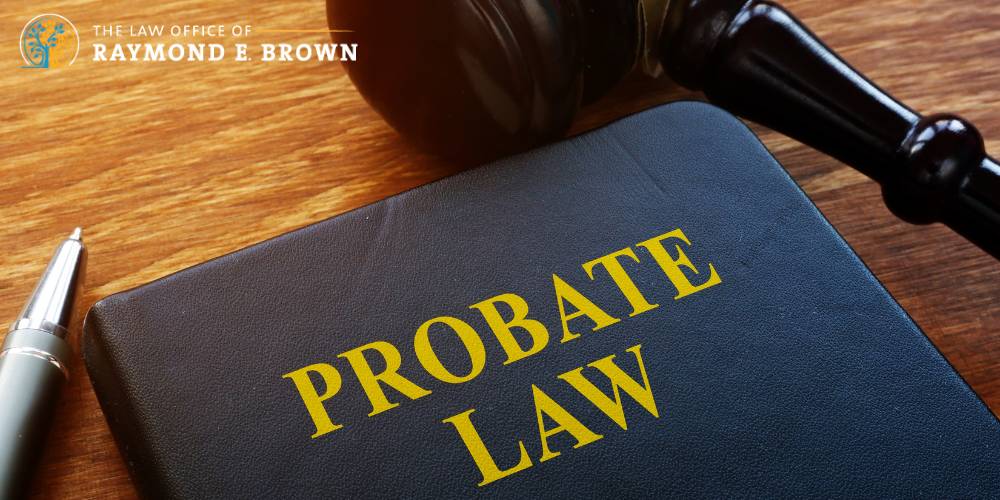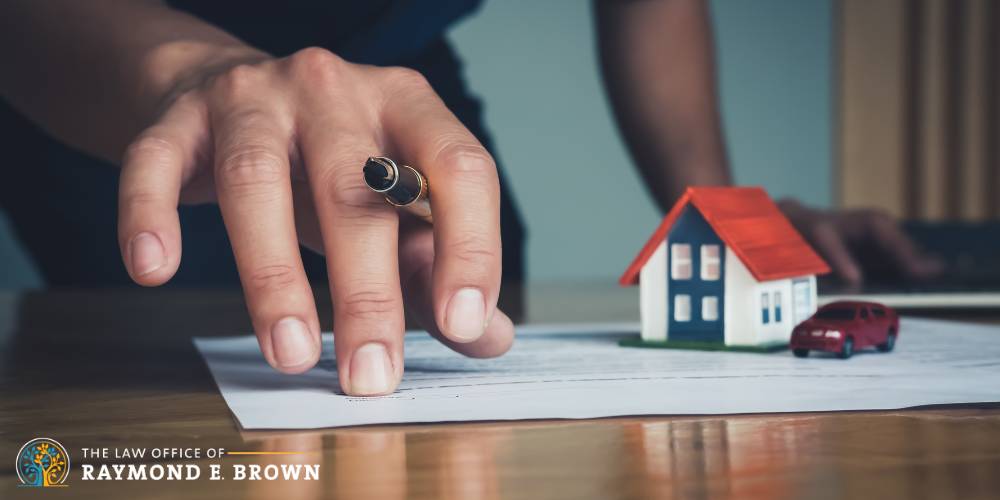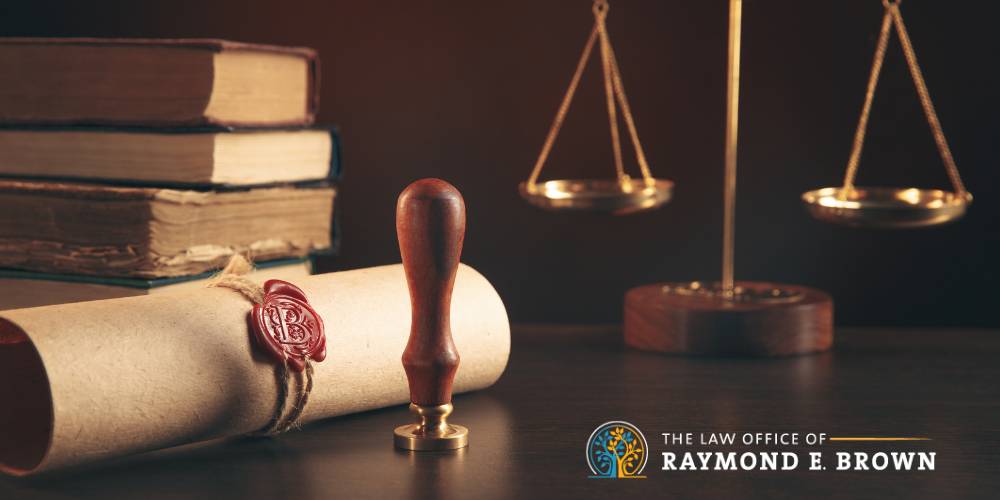The estate planning process allows you to ensure your wishes are carried out after your death, but it also allows you to make things easier for your loved ones in the wake of your passing. One thing many people consider when starting the estate planning process is avoiding the probate process.
In this blog, we’ll explain how the probate process works, how to avoid probate in Maryland, and how an estate planning attorney can help guide you through the process. At The Law Office of Raymond E. Brown, we have extensive experience in estate planning and handling probate matters, allowing us to help our clients protect their legacies and plan for the future.
If you live in Maryland and you want to secure your assets and protect them from the probate process, contact an Annapolis estate planning lawyer at the Law Office of Raymond E. Brown today. We want to ensure you make the best decisions for yourself as well as your family, and can provide you with the legal assistance you need to establish an estate plan that meets your goals. Call (443) 554-9944 or contact us online to schedule a consultation with Attorney Raymond E. Brown today.
Understanding the Maryland Probate Process
Probate is the legal process through which a deceased person’s will is validated, their estate assets are identified, their debts are settled, and their property is distributed according to their last will and testament. If the deceased person didn’t have a will, their assets are distributed in accordance with Maryland law.
In Maryland, if a person dies and they have a will, they will have someone named as the personal representative on their will. If a person dies without a will, someone will be appointed as the personal representative of their estate. The personal representative is responsible for gathering the necessary legal documents, identifying probate assets, filing the required tax documents, paying off any debts, and distributing assets to the beneficiaries.

Is Probate Required in Maryland?
Yes, probate is required in Maryland, but only for individuals who have assets that are only listed in their name. Those who only have certain, non-probate assets to their name can avoid the probate process altogether. Assets like joint bank accounts, life insurance policies, trusts, and retirement accounts are exempt from probate and will usually be passed on to the named beneficiary or beneficiaries upon an individual’s death.
How To Avoid Probate Court
Most wills will go through probate, but luckily, there are things that you can incorporate into your estate plan to help protect your assets from the probate process. Below are some of the most common ways individuals avoid probate court in Maryland and beyond.
Joint Ownership with Rights of Survivorship
Most jointly owned assets can avoid the probate process, especially if the assets have rights of survivorship. This means that when one owner passes away, their share automatically transfers to the surviving owner, usually a surviving spouse, without the need for probate. Things like life estate deeds are forms of joint ownership assets.
Payable-on-Death and Transfer-on-Death Accounts
Payable-on-death (POD) and transfer-on-death (TOD) accounts are financial arrangements where the account owner designates one or more beneficiaries to receive the account’s funds upon the owner’s death. For POD accounts, this typically applies to bank accounts, while TOD arrangements are common for investment accounts such as stocks, bonds, or mutual funds.
Upon the account owner’s death, the designated beneficiary simply needs to present a death certificate to claim the assets, bypassing probate.

Revocable Living Trusts
Another way to avoid probate is through establishing a revocable living trust. A revocable living trust is a legal arrangement in which the trust creator (also known as the grantor) transfers ownership of their assets into the trust. The trust document outlines how assets are to be managed and distributed during the grantor’s lifetime and upon their death.
Revocable living trusts help avoid probate in Maryland by ensuring trust assets are passed directly to the trust’s beneficiaries upon the grantor’s death without the need for probate proceedings. There are many different kinds of trusts that individuals can establish during their lifetime, most of which will avoid the probate process. If you are interested in creating a trust, an experienced Maryland trust lawyer like Raymond E. Brown can help you choose the right trust for your individual financial needs and goals.
Gifting During Lifetime
People can also avoid probate by gifting some of their assets to others during their lifetime. These gifts can include things like cash, real estate, investments, or other valuable assets. By giving these assets to others, individuals can reduce the overall value of their estate, potentially lowering their estate tax liabilities and avoiding probate on those assets.
Beneficiary Designations
Another good way to avoid probate is by having designated beneficiaries who will inherit various assets or benefits upon the policyholder’s death. Beneficiary designation is normally used for things like retirement accounts, life insurance policies, and certain financial accounts. The named beneficiaries can be individuals, certain organizations, or trusts.
These designations bypass probate and ensure that assets are transferred directly to the designated beneficiaries, according to the terms specified by the account or policy owner.
Maryland Small Estate Administration
If someone has a smaller estate, their family may be able to go through a simplified and expedited probate proceeding. Estates that are worth $50,000 or less (or $100,000 or less if it’s passing to a surviving spouse) may qualify for “small estate” proceedings, which are often much faster than normal probate proceedings. While small estates aren’t able to completely bypass probate, having a smaller estate can help expedite the process and make it easier for the estate’s beneficiaries.

Common Misconceptions About Avoiding Probate
There are a lot of misconceptions people have about the probate process, some of which include:
- The belief that a will alone avoids probate – While a will provides instructions for distributing assets, it typically still requires probate to be legally executed.
- Assuming joint ownership automatically avoids probate – While joint ownership can bypass probate for certain assets, it doesn’t always apply universally and might have unintended consequences.
- Thinking all assets can be transferred outside probate – Certain assets, like retirement accounts or life insurance policies, pass directly to named beneficiaries, but not all assets can be transferred this way.
- Overlooking the need to update beneficiary designations – Failure to update beneficiary designations can lead to assets going through probate, even if the intention was to avoid it.
- The belief that estate planning is only about avoiding probate – While avoiding probate is a common goal, estate planning encompasses broader objectives such as minimizing estate taxes, ensuring healthcare directives, and protecting assets.
- Assuming trusts are the only solution – While trusts can be effective in avoiding probate, they may not be necessary or suitable for everyone’s situation.
- Ignoring state-specific laws – Probate laws vary by state, so what may help someone avoid probate in one state may not be as effective at avoiding probate in another. Maryland residents will need to reach out to an attorney who has experience handling estate planning matters in Maryland.
How an Experienced Estate Planning Attorney Can Help Clients Avoid Probate
An experienced estate planning attorney can provide individuals with valuable legal guidance and strategies to help them avoid the probate process. First and foremost, they can help establish a comprehensive estate plan that is tailored to their client’s specific needs and wants, helping them establish wills, trusts, and other legal documents that help avoid probate.
They can also advise individuals on how to designate beneficiaries for various accounts and benefits and can provide them with expert gifting strategies to help reduce tax liabilities. Maryland estate planning attorneys can also help their clients review and update their estate plans as time goes on, ensuring that their documents are in compliance with any new laws and adjusted to changes in their clients’ lives.
If you are looking to help your loved ones avoid going through probate, it’s important to ensure you have proper legal guidance throughout the estate planning process. Attorney Raymond E. Brown is experienced in probate avoidance planning and can help you establish an estate plan that makes the process as streamlined and efficient as possible for your loved ones.

Call an Annapolis, MD Probate Lawyer at The Law Office of Raymond E. Brown Today
At the Law Office of Raymond E. Brown, we understand how important it is to protect your loved ones from dealing with the probate court. If you want to ensure that your assets are seamlessly transferred to your loved ones, developing an estate plan can help make the probate process as smooth and as fast as possible.
Our seasoned Annapolis probate lawyers understand the intricacies of Maryland probate law and are ready to guide you through every step. Whether you’re looking to develop a plan for your own estate, or you’re in the middle of administering a loved one’s estate, we are here to offer knowledgeable advice tailored to your unique situation.
Call us at (443) 554-9944 or reach out to us online to schedule a consultation with an experienced Annapolis, Maryland estate planning attorney today.

